Mathematical Knowledge: Philosophical and Sociological Perspectives
11–13 February 2026, Brussels
All details available at:
https://sites.google.com/view/math-know-phil-socio
Events 2025/26 (upcoming)
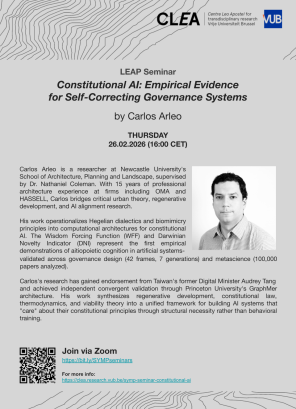 Practical info26/02/2026 - 16:00 - 26/02/2026 - 17:00
Practical info26/02/2026 - 16:00 - 26/02/2026 - 17:00CONSTITUTIONAL AI: EMPIRICAL EVIDENCE FOR SELF-CORRECTING GOVERNANCE SYSTEMS - BY CARLOS ARLEO
In this presentation, Carlos Arleo challenges the industry standard of AI alignment, arguing that current methods—which treat safety as a behavioral training problem—only produce superficial conformity. Here, he presents empirical validation of aitiopoietic cognition from constitutional physics through the Wisdom Forming Function, a paradigm shift from training AI to behave correctly toward alignment-by-architecture, where constitutional compliance is a fundamental requirement for the system’s computational existence.
Events 2025/26 (archive)
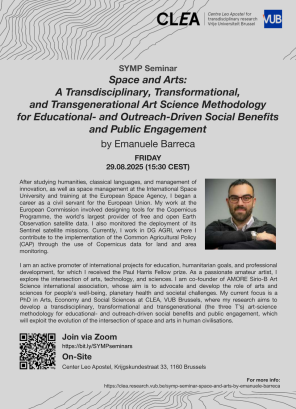 Practical info29/08/2025 - 15:30 - 29/08/2025 - 16:30
Practical info29/08/2025 - 15:30 - 29/08/2025 - 16:30SPACE AND ARTS: A TRANSDISCIPLINARY, TRANSFORMATIONAL, AND TRANSGENERATIONAL (“THE THREE TS”) ART SCIENCE METHODOLOGY FOR EDUCATIONAL- AND OUTREACH-DRIVEN SOCIAL BENEFITS AND PUBLIC ENGAGEMENT - BY EMANUELE BARRECA
In this talk, Emanuele Barreca shows how fusing space and art - combining Earth-observation data with ancient perspectives - can drive transformational, experiential learning and public engagement. He outlines a transdisciplinary method for inclusive knowledge transfer with applications in agriculture, ecology, and cultural heritage.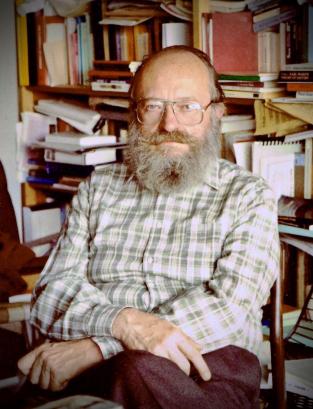 Practical info04/09/2025 - 09:00 - 05/09/2025 - 18:00
Practical info04/09/2025 - 09:00 - 05/09/2025 - 18:00Leo Apostel: 100th anniversary celebration
Leo Apostel (1925–1995) was a Belgian logician-philosopher and pioneer of interdisciplinary worldviews who would have turned 100 this year. Ghent University and VUB mark his centenary with a two-day event: Sept 4 at the Ghent Boekentoren (retrospective) and Sept 5 at VUB Ixelles highlighting CLEA research.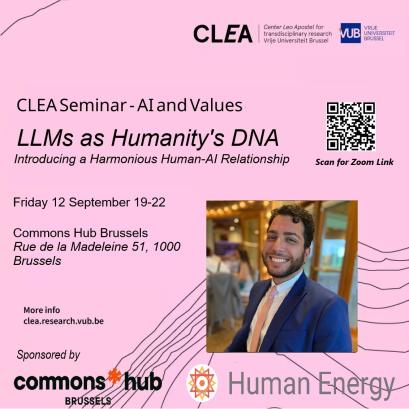 Practical info12/09/2025 - 19:00 - 12/09/2025 - 22:00
Practical info12/09/2025 - 19:00 - 12/09/2025 - 22:00LLMs as Humanity's DNA: Introducing a Harmonious Human-AI Relationship Through a Biosemiotic Lens
In this talk, Parham Pourdavood recasts LLMs as cultural “DNA”: semiotic substrates that compress human expression and become meaningful only through human reinterpretation, creating a recursive creativity loop. Within this biosemiotic framework, LLMs serve as evolutionary tools for low-stakes hypothesis generation while humans ground the outputs in cultural norms and aesthetics.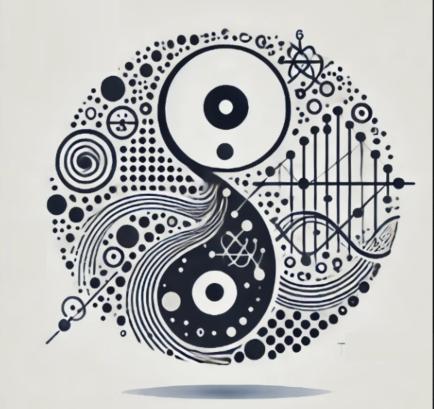 Practical info06/10/2025 - 00:00 - 06/10/2025 - 00:00
Practical info06/10/2025 - 00:00 - 06/10/2025 - 00:00Artificial Life 2025 Workshop: Matter-Information Interplays: Goal-Directedness in Metasystem Transitions
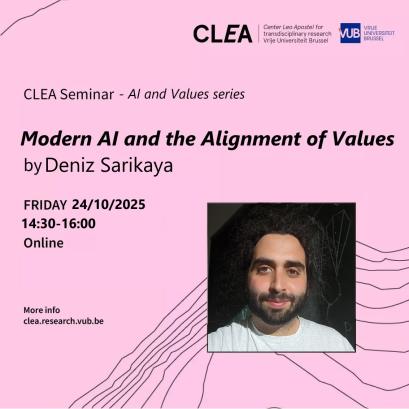 Practical info24/10/2025 - 14:30 - 24/10/2025 - 16:00
Practical info24/10/2025 - 14:30 - 24/10/2025 - 16:00Modern AI and the Alignment of Values (Online)
Deniz Sarikaya is our October speaker at the AI and Value series he will discuss how categories that influence alignment between humans can inform about the categories that should be controlled to improve on the AI alignment problem when creating large data sets to be used by supervised and unsupervised learning algorithms.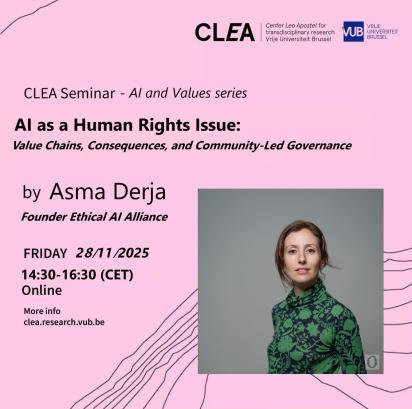 Practical info28/11/2025 - 14:30 - 28/11/2025 - 16:30
Practical info28/11/2025 - 14:30 - 28/11/2025 - 16:30AI as a Human Rights Issue: Value Chains, Consequences, and Community-Led Governance
By Asma Derja (Ethical AI Alliance): This talk argues that AI has become a human rights issue. The focus is not only on failures at deployment but on harms that emerge at every stage of the value chain.
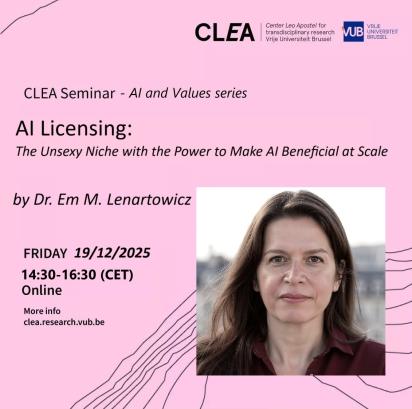 Practical info19/12/2025 - 14:30 - 19/12/2025 - 16:30
Practical info19/12/2025 - 14:30 - 19/12/2025 - 16:30AI Licensing: The Unsexy Niche with the Power to Make AI Beneficial at Scale
Imagine an AI that scans your biology and keeps you so well that you never need a doctor. Or an AI that follows your thinking patterns and offers insights so precisely timed that nobody ever needs a school again.
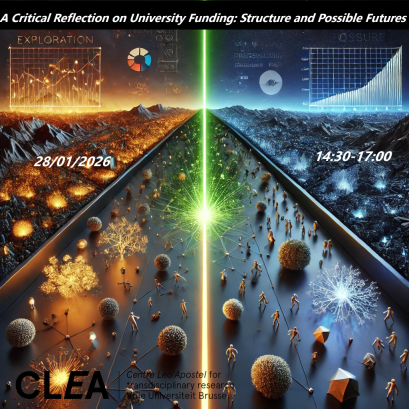 Practical info28/01/2026 - 14:30 - 28/01/2026 - 18:00
Practical info28/01/2026 - 14:30 - 28/01/2026 - 18:00A Critical Reflection on University Funding: Structure, Trends and Possible Futures
The modern university stands at a crossroads. Once conceived as a sanctuary for disinterested knowledge and philosophical inquiry, it is increasingly shaped by external funding models that prioritize market utility, short-term impact, and commercial applicability.
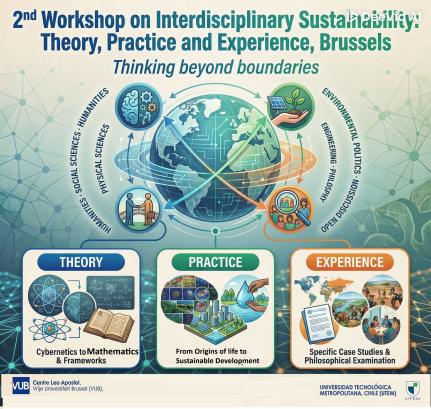 Practical info10/02/2026 - 09:00 - 12/02/2026 - 18:00
Practical info10/02/2026 - 09:00 - 12/02/2026 - 18:002nd Workshop on Interdisciplinary Modeling of Sustainable Processes
Events 2024/25
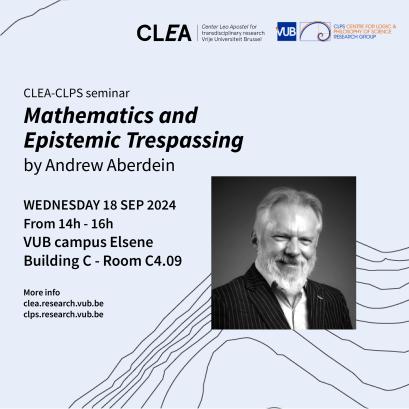 Practical info18/09/2024 - 14:00 - 18/09/2024 - 16:00
Practical info18/09/2024 - 14:00 - 18/09/2024 - 16:00CLEA - CLPS SEMINAR. Mathematics and Epistemic Trespassing - by Andrew Aberdein
“Epistemic trespassing” is a recently proposed term to describe experts who make pronouncements outside their domain of expertise. Such trespassing can be productive, but caution is required. How does epistemic trespassing apply to mathematics? In this seminar, professor Andrew Aberdein will distinguish three cases of trespassing and identify both benign and malign examples, which will help clarify some features of epistemic trespassing in general. FOR MORE INFO, PLEASE CLICK TITLE- Practical info29/11/2024 - 17:00 - 29/11/2024 - 18:15
SYMP SEMINAR. Thermodynamics constrains information flow in metabolic networks - by Christian Euler
Metabolism is an open thermodynamic system characterized by mass, energy, and information exchanges with the environment. Many environmental and internal signals are initially processed by metabolic reactions before they can influence transcription and translation. Yet, the capacity of metabolic networks to process and transmit information remains largely unexplored. Bioinformatic evidence supporting the hypothesis that metabolism has evolved to conserve information flow in varied conditions will be presented, and implications of these results for goal-directedness within the metabolism-first hypothesis of the origin of life will be discussed. ZOOM INFORMATION IN THE LINK 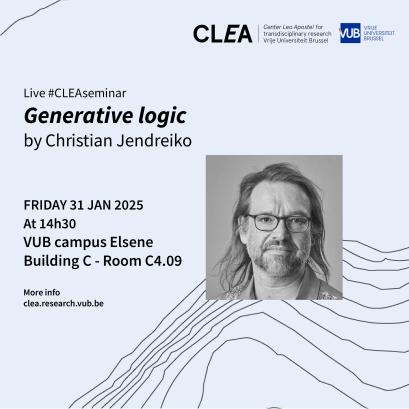 Practical info31/01/2025 - 14:30 - 31/01/2025 - 16:30
Practical info31/01/2025 - 14:30 - 31/01/2025 - 16:30CLEA SEMINAR. Generative logic - by Christian Jendreiko
Prof. Christian Jendreiko's research focuses on the transdisciplinary foundation of generative systems in artistic multimedia. His concept of Generative Logic models the artistic process using formal logic and provides a framework for applying logic to create aesthetically compelling results in AI, art, and design. In our upcoming seminar, he will introduce this concept and present a series of current research questions, followed by an opportunity for discussion. Practical info14/02/2025 - 15:30 - 14/02/2025 - 18:00
Practical info14/02/2025 - 15:30 - 14/02/2025 - 18:00CLEA SEMINAR & IMAGINARY INSTITUTE. Vacuum for outer space, memory for inner space - by Mixel Kiemen
In this seminar, Mixel Kiemen will present his decade-long research on the System of Creation (SoC), exploring the evolution of cybernetic models and the emergence of novel phenomena. He will delve into the relationship between the material and immaterial worlds, proposing the 'noosphere' as a potential catalyst for a new Mind Revolution, while examining the mysteries of memory and inner space.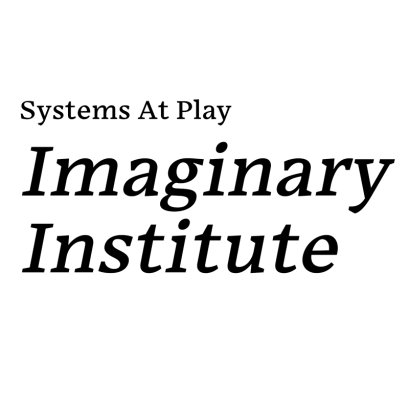 Practical info14/02/2025 - 11:00 - 15/02/2025 - 17:00
Practical info14/02/2025 - 11:00 - 15/02/2025 - 17:00Imaginary Institute Symposium - 14 and 15 February, Brussels
We invite you to a two-day symposium to collectively imagine the Imaginary Institute, a new initiative by the CLEA ArtScience group. Click the title to learn more!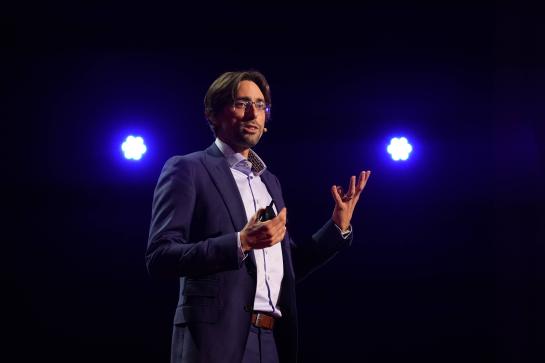 Practical info18/02/2025 - 16:00 - 18/02/2025 - 18:00
Practical info18/02/2025 - 16:00 - 18/02/2025 - 18:00SEMINAR. Life at a stellar scale: clues of stellivores through metabolism, navigation and propulsion - by Clément Vidal
CLEA researcher Clément Vidal will be giving an online seminar for the European Astrobiology Institute on Tuesday, February 18, 2025.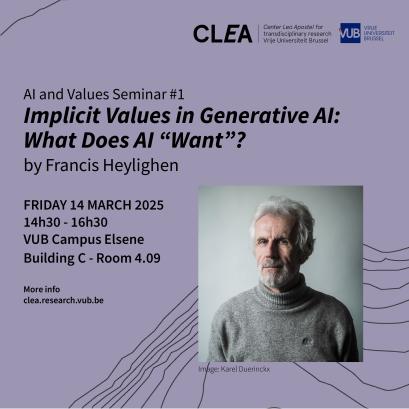 Practical info14/03/2025 - 14:30 - 14/03/2025 - 16:30
Practical info14/03/2025 - 14:30 - 14/03/2025 - 16:30AI and Values Seminar #1 - Implicit Values in Generative AI: What Does AI "Want"? - by Francis Heylighen
The rise of generative AI has sparked both excitement and concern. While the latest models are surprisingly effective in helping people solve their problems, they also raise ethical questions about manipulation, bias, and the potential for AI to control humans. At the core is the question: What drives AI? Do these models have goals or values, and if so, which values do they reflect? CLEA research director Francis Heylighen will shed light on these issues.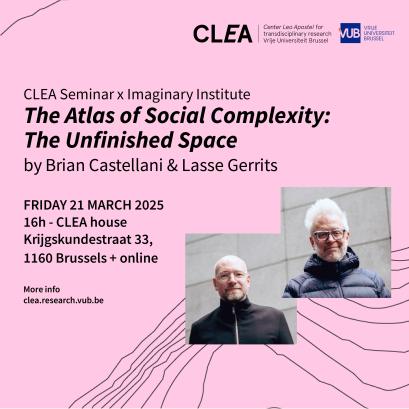 Practical info21/03/2025 - 16:00 - 21/03/2025 - 18:00
Practical info21/03/2025 - 16:00 - 21/03/2025 - 18:00CLEA SEMINAR & IMAGINARY INSTITUTE. The Atlas of Social Complexity: The Unfinished Space - by Brian Castellani & Lasse Gerrits
In the upcoming CLEA x ii seminar session, we invite Brian Castellani and Lasse Gerrits to explore their seminal work, The Atlas of Social Complexity. We will focus on their final chapter, The Unfinished Space, asking how we can ensure that the study of social complexity remains disruptive. Themes we will explore include open-ended knowledge, embracing uncertainty, unease and discomfort, networks without hierarchy, keeping disciplines porous, cultivating generative collaborations, and creating the conditions for new ideas. For more info, click the title.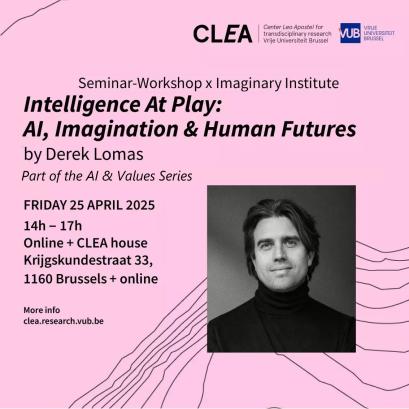 Practical info25/04/2025 - 14:00 - 25/04/2025 - 17:00
Practical info25/04/2025 - 14:00 - 25/04/2025 - 17:00CLEA SEMINAR & IMAGINARY INSTITUTE. Intelligence At Play: AI, Imagination & Human Futures - by Derek Lomas - Part of the "AI & Values" Series
The next CLEA AI and Values seminar on Friday, April 25, takes place within the context of the third Imaginary Institute symposium. The Friday seminar programme consists of four parts. Derek Lomas will present a seminar (IRL and online) offering a fresh philosophical compass for navigating the emerging age of Artificial Super Intelligence (ASI). This will be followed by two AI workshops on generative play and future visions at the CLEA House, also led by Lomas, and an evening hang-out.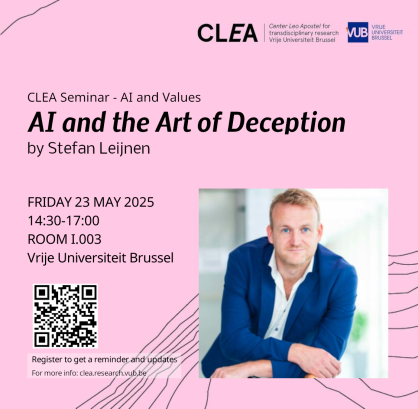 Practical info23/05/2025 - 14:30 - 23/05/2025 - 17:00
Practical info23/05/2025 - 14:30 - 23/05/2025 - 17:00AI and the Art of Deception
Summary: Stefan Leijnen, Professor in Artificial Intelligence at Utrecht University of Applied Sciences, will discuss how the troublesome relation between AI and values stem from misunderstanding the truthfulness of AI systems; then, drawing from Zen Buddhist principles of non-duality and non-deceptiveness, we will explore how to design and deploy AI in ways that nurture clarity, honesty, and genuine understanding. Dr Leijnen directs research on machine learning and data-driven innovation. His scholarly work investigates the intersections of generative AI, open-endedness, goal-directedness, and creativity, with particular attention to Eastern philosophical frameworks. Beyond his academic research, he teaches zen meditation, and serves as Head of EU Relations at the AI Coalition for the Netherlands and Vice President of the European AI-Data-Robotics Association, where he contributes to the European strategy for AI innovation and ecosystem development.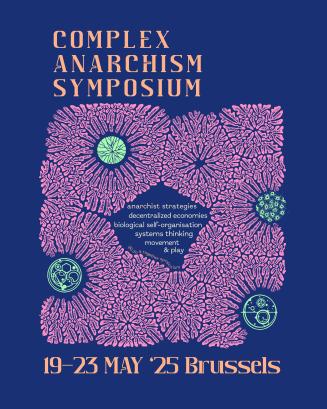 Practical info19/05/2025 - 10:00 - 23/05/2025 - 18:00
Practical info19/05/2025 - 10:00 - 23/05/2025 - 18:00Complex Anarchism Symposium, 19-23 May 2025 in Brussels
With the upcoming Complex Anarchism symposium, we will be exploring the intersection between anarchism and complexity science. Anarchy, despite its popular definition as a state of disorder, is rather a mode of being where we organize ourselves voluntarily, that is, without coercion from a central controller or hierarchical system. During the symposium, we aim to apply and explore the interplay between these practices and concepts in order to experiment with alternative ways to organize our society.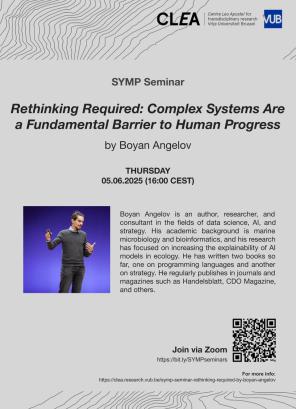 Practical info05/06/2025 - 16:00 - 05/06/2025 - 17:00
Practical info05/06/2025 - 16:00 - 05/06/2025 - 17:00SYMP SEMINAR. Rethinking Required: Complex Systems Are a Fundamental Barrier to Human Progress - by Boyan Angelov
About the Seminar
In this talk, I will present the arguments of the central thesis of my upcoming book, The Study of Progress: First Principles on the Brink of Runaway Complexity.
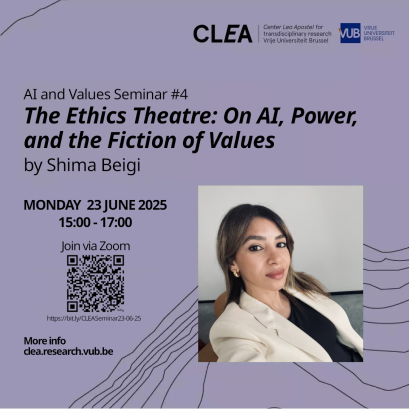 Practical info23/06/2025 - 15:00 - 23/06/2025 - 17:00
Practical info23/06/2025 - 15:00 - 23/06/2025 - 17:00AI and Values Seminar #4 - The Ethics Theatre: On AI, Power, and the Fiction of Values - by Shima Beigi
This talk explores the hidden dynamics of AI ethics and the societal challenges amplified by technology. It calls for a deeper reckoning beyond surface debates — a return to genuine truth in a fractured world. Practical info27/06/2025 - 10:30 - 28/06/2025 - 18:00
Practical info27/06/2025 - 10:30 - 28/06/2025 - 18:00Imaginary Institute Symposium - 27 and 28 June, Brussels
We invite you to the next two-day symposium to collectively imagine the Imaginary Institute, a new initiative by the CLEA ArtScience group. Click the title to learn more!
Events 2023/24
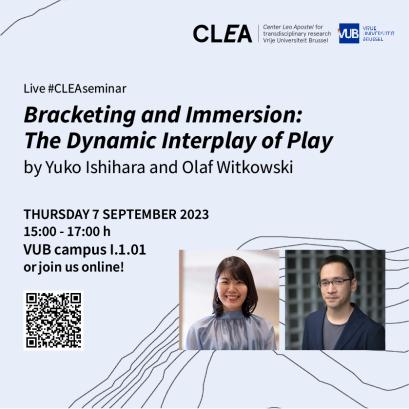 Practical info07/09/2023 - 15:00 - 07/09/2023 - 17:00
Practical info07/09/2023 - 15:00 - 07/09/2023 - 17:00CLEA SEMINAR. Bracketing and Immersion: The Dynamic Interplay of Play - by Yuko Ishihara and Olaf Witkowski
The concept of play involves immersing oneself in a world without judgment of its rules. In this seminar, Yuko Ishihara and Olaf Witkowski will explore the roles of play, bracketing, and immersion in living and learning systems, suggesting that within structured boundaries, play can help agents evolve. This perspective on play connects various research fields, such as neurophenomenology, cognitive science, artificial intelligence, and artificial life. FOR MORE INFO > PLEASE CLICK TITLE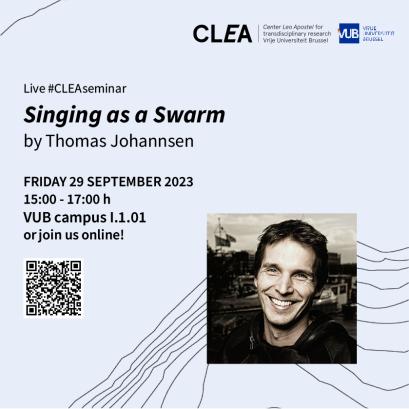 Practical info29/09/2023 - 15:00 - 29/09/2023 - 17:00
Practical info29/09/2023 - 15:00 - 29/09/2023 - 17:00CLEA SEMINAR. Singing as a Swarm - by Thomas Johannsen
Genetic Choir is a music creation method that relies on self-organizing principles, using human singers to create instant compositions. It explores the balance between individual creative intuition and collaborative connection, making it accessible to people with varying musical backgrounds. In this seminar, founder Thomas Johannsen will give an inside look into the choir’s practices and share insights related to self-organisation and emergence when applied to music making without a script, score or conductor. FOR MORE INFO > PLEASE CLICK TITLE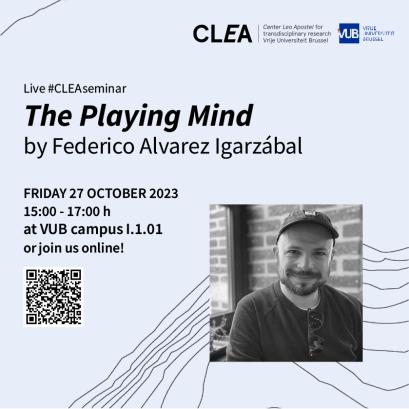 Practical info27/10/2023 - 15:00 - 27/10/2023 - 17:00
Practical info27/10/2023 - 15:00 - 27/10/2023 - 17:00CLEA SEMINAR. The Playing Mind - by Federico Alvarez Igarzábal
Play is an activity that emerges naturally in humans across time and cultures. From early on, children play-fight, play-pretend, and participate in games. Grown-ups also play sports, characters in theater and film, card games, and video games. But what does it mean exactly to be at play? Play has been studied primarily either in terms of its formal characteristics, or its social and developmental functions. In this seminar, Federico Alvarez Igarzábal will propose a novel framework for the study of play as a mental state based on philosopher Tamar Gendler’s research on the concepts of "alief" and "belief". FOR MORE INFO > PLEASE CLICK TITLE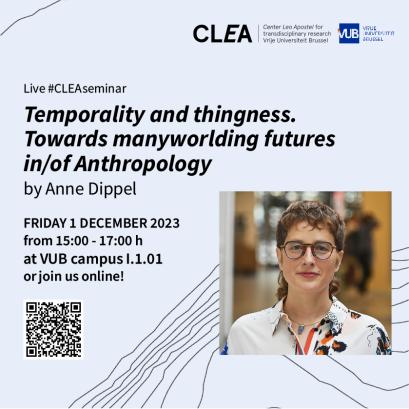 Practical info01/12/2023 - 15:00 - 01/12/2023 - 17:00
Practical info01/12/2023 - 15:00 - 01/12/2023 - 17:00CLEA SEMINAR. Temporality and thingness. Towards manyworlding futures in/of Anthropology - by Anne Dippel
Multiple agents weave the fabric of temporality in a data-driven world, at the same time orchestrating futures and visions of (un)certainty and sparking promises to contain what is to come. The possibilities of modeling the world with algorithmic means are changing our time and space perceptions. How do phenomena come into being? How does temporality operate within complex infrastructures, entangling humans and more-than-humans in a techno scientific, posthuman world of many worlds? In this talk, Anne Dippel will address the above questions. FOR MORE INFO > PLEASE CLICK TITLE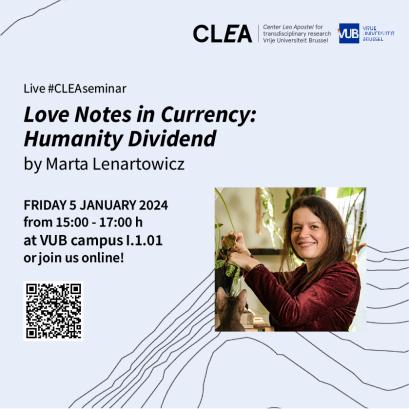 Practical info05/01/2024 - 15:00 - 05/01/2024 - 17:00
Practical info05/01/2024 - 15:00 - 05/01/2024 - 17:00CLEA SEMINAR. Love Notes in Currency: Humanity Dividend - by Marta Lenartowicz
This seminar will serve as the opening episode in a series of conversations aimed at actualising the idea of an unconditional, universal basic income. This idea has been advanced by so many prominent thinkers and rejected on so many different grounds—arguably, mostly psychological and metaphysical—that it may make little sense to simply debate it with every conceivable argument for and against. Instead, this seminar will serve as a conversation adopting the vantage point of the year 2039, assuming that the basic income is already a fact. Participants will be invited to contribute their elaborations and insights, focusing on how its implementation occurred and why it was possible. FOR MORE INFO > PLEASE CLICK TITLE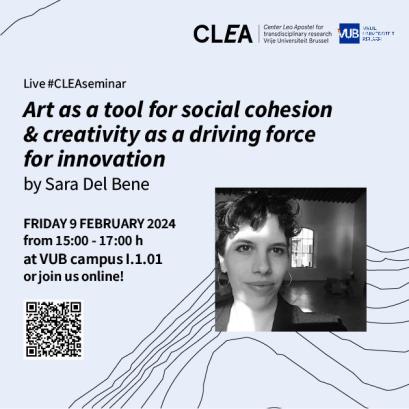 Practical info09/02/2024 - 15:00 - 09/02/2024 - 17:00
Practical info09/02/2024 - 15:00 - 09/02/2024 - 17:00CLEA SEMINAR. Art as a tool for social cohesion and creativity as a driving force for innovation - by Sara Del Bene
In this seminar, Sara Del Bene will explore the role of contemporary artists in community-building. In the contemporary vision of art, there is a desire to see the audience not (merely) as spectators, but (also) as actors; new active art forms focus on relationships and creating a community. Del Bene will illustrate the definitions and the main characteristics of relational art, social art, and interactive and participatory art. She will also explore its aesthetic limits, authorship, and social impact. For more info, CLICK TITLE.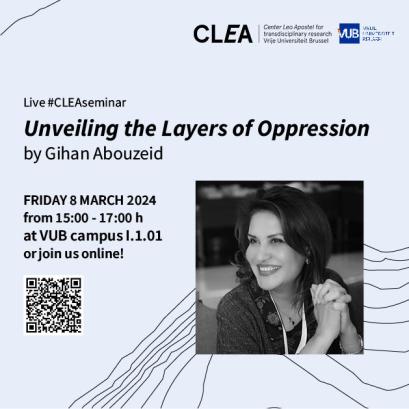 Practical info08/03/2024 - 15:00 - 08/03/2024 - 17:00
Practical info08/03/2024 - 15:00 - 08/03/2024 - 17:00CLEA SEMINAR. Unveiling the Layers of Oppression - by Gihan Abouzeid
There are many ways to study the spread of female Islamic preachers in Egypt, a phenomenon that began in the mid-eighties, creating a rare achievement for horizontally formed feminist groups. In this seminar, Gihan Abouzeid will analyse how female Islamic preachers have become a tool for supporting the current oppressive systems. How do progressive developments get turned into a tool in the hands of oppressive regimes? How do different systems of oppression work together, and how do we resist these intersecting systems?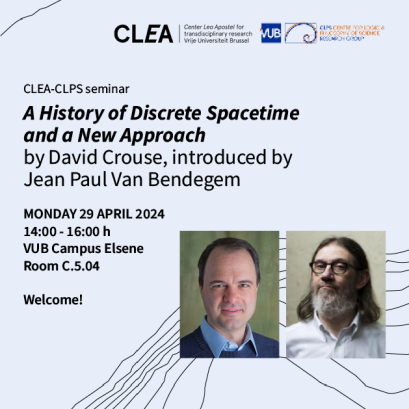 Practical info29/04/2024 - 14:00 - 29/04/2024 - 16:00
Practical info29/04/2024 - 14:00 - 29/04/2024 - 16:00CLEA-CLPS SEMINAR. A History of Discrete Spacetime and a New Approach - by David Crouse & Jean Paul Van Bendegem
If you are intrigued by the long-standing question whether spacetime is discrete or continuous, this upcoming seminar is an excellent opportunity. Professor Jean Paul Van Bendegem, former director of the CLPS, has invited Prof. David Crouse from Clarkson University, US, to explore the concept of discrete spacetime. We will discuss a new model that strives to address all the problems with discrete spacetime and give the concept a firm foundation. Welcome! (click title for more info) Practical info17/05/2024 - 15:00 - 17/05/2024 - 17:00
Practical info17/05/2024 - 15:00 - 17/05/2024 - 17:00CLEA SEMINAR. Second Renaissance: A Time Between Worlds - by Rufus Pollock & Life Itself
The period between the decline of an old regime and the rising of a new way of life offers a space of both risk and opportunity. How do we present what is happening and some key ideas of this “space" in an accessible way, also to people not yet "in the space"? In this talk, Rufus Pollock and the Life Itself Research Collective will present the concept of a Second Renaissance and explore what's needed for a radical transformation. For more info, please click the title.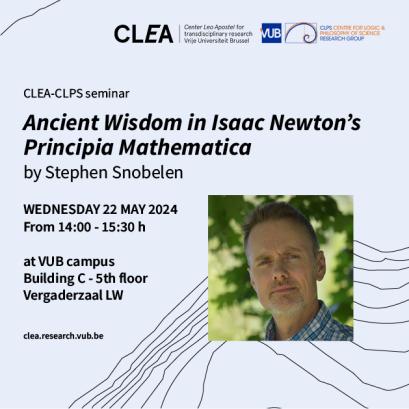 Practical info22/05/2024 - 14:00 - 22/05/2024 - 15:30
Practical info22/05/2024 - 14:00 - 22/05/2024 - 15:30CLEA-CLPS SEMINAR. Ancient Wisdom in Isaac Newton's Principia Mathematica - by Stephen Snobelen
While Isaac Newton is widely celebrated for his contributions to physics and mathematics, he also wrote extensively on religious and theological matters. In this seminar, Stephen Snobelen will explore two manuscripts - Newton's Classical Scholia and General Scholium - to gain a deeper understanding of Newton's worldview and the connections he perceived between science and religion. For more info, please click the title. Practical info24/05/2024 - 15:00 - 24/05/2024 - 17:00
Practical info24/05/2024 - 15:00 - 24/05/2024 - 17:00CLEA SEMINAR. Curiosity, Awe and Wonder: the emotions that open our mind - by Francis Heylighen
This seminar will explore how the epistemic emotions of curiosity, awe, and wonder can promote critical thinking and open-mindedness by motivating us to expand our knowledge. Newtonian science ignores such emotions, proposing a purely rational, reductionist picture of the world as a clockwork mechanism. However, the new scientific worldview sees the universe as evolving while producing endless novelty. The scientific exploration of this infinite potential can benefit from practices that promote awe and wonder, such as experiencing natural landscapes, artistic beauty, complex patterns, and mathematical infinity. Welcome! For more info, please click the title. Practical info28/05/2024 - 15:00 - 28/05/2024 - 17:00
Practical info28/05/2024 - 15:00 - 28/05/2024 - 17:00CLEA SEMINAR. Aesthetics precedes ethics - by Raphaël Liogier
In this seminar, Raphaël Liogier will discuss the prevalence of negativity in today's world, tracing it back to a nihilistic reversal of modernity. He will explore how this reversal has impacted society, focusing on two cycles: technique for technique's sake and identity for identity's sake. Ultimately, he will propose the idea that aesthetics, yet to be fully understood, may offer a path to escape these cycles and save the human world. Welcome! For more info, please click the title. Practical info14/06/2024 - 12:00 - 14/06/2024 - 14:00
Practical info14/06/2024 - 12:00 - 14/06/2024 - 14:00CLEA-CLPS SEMINAR. Limit objects and emergence - by Miklós Rédei
In this seminar, Miklos Redei will discuss the role and features of limit objects in physical theories, including their emergent properties. He will highlight the tension in physics between describing all phenomena and only including observable entities. This tension is illustrated by the infinite Ising model's phase transition description, and Redei will propose ways to manage this conflict. FOR MORE INFO, PLEASE CLICK TITLE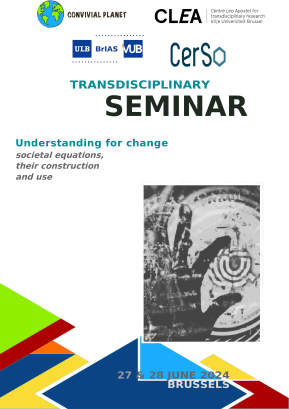 Practical info27/06/2024 - 09:00 - 28/06/2024 - 18:00
Practical info27/06/2024 - 09:00 - 28/06/2024 - 18:00Maths and Society Seminar: Changing the Models? Brussels, June 2024
How can mathematics contribute to achieving the UN's Sustainable Development Goals more effectively? What kind of mathematical models do we want for sustainable development? On June 27 and 28, the two-day seminar-workshop 'Maths and Society' in Brussels will explore these key questions. Participation is free. Please click the title to find out more.
Events 2022/23
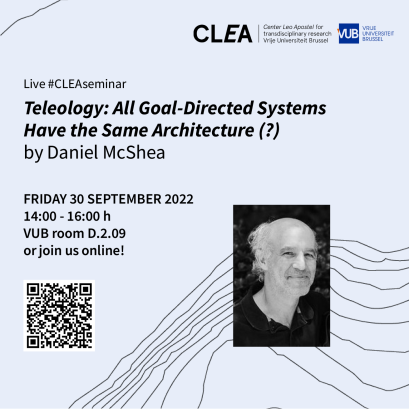 Practical info30/09/2022 - 14:00 - 30/09/2022 - 16:00
Practical info30/09/2022 - 14:00 - 30/09/2022 - 16:00CLEA SEMINAR. Teleology: All Goal-Directed Systems Have the Same Architecture (?) - by Daniel McShea
In this seminar, paleobiologist Daniel McShea will propose a theory of goal-directedness based on the ‘hierarchy theory’. His claim is that goal-directedness arises in physically nested hierarchical systems when a lower-level 'entity' is directed by a higher-level (external) ‘field’ in which the entity is immersed, like for example a sunflower (entity) tracking the sun (field). McShea boldly states that all goal-directed systems, from simple to complex, have this ‘entity within a field’ architecture. He will also discuss an intriguing consequence of his theory: a new view of freedom.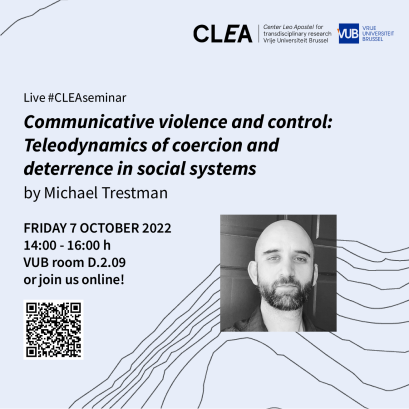 Practical info07/10/2022 - 14:00 - 07/10/2022 - 16:00
Practical info07/10/2022 - 14:00 - 07/10/2022 - 16:00CLEA SEMINAR. Communicative violence and control: Teleodynamics of coercion and deterrence in social systems - by Michael Trestman
Complex goal-directed systems like biological organisms maintain themselves through self-generation. Their goal-directed behaviour is focused on avoiding disruptions of these processes. When agents are competing, second-order goal-directed behaviour emerges wherein they manipulate each other via coercion or deterrence. Under what conditions do these forms of violence emerge? What are the developmental, ecological and evolutionary signatures of coercion and deterrence in biological, social and technological systems? What implications might there be for reducing their prevalence? In this seminar, Michael Trestman will discuss these intriguing questions.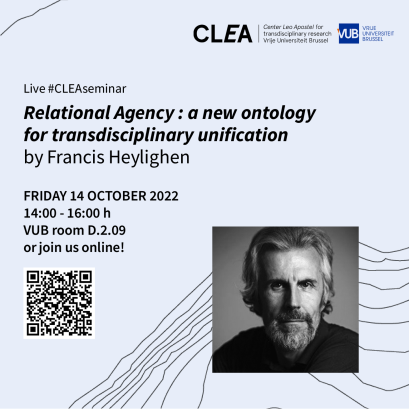 Practical info14/10/2022 - 14:00 - 14/10/2022 - 16:00
Practical info14/10/2022 - 14:00 - 14/10/2022 - 16:00CLEA SEMINAR. Relational Agency: a new ontology for transdisciplinary unification - by Francis Heylighen
The traditional scientific worldview tries to explain all phenomena by reducing them to static objects moved by external forces. This Newtonian perspective cannot explain emergent, adaptive phenomena such as goal-directedness, life, mind, society or consciousness. To integrate these phenomena within a unified science, we need to replace the traditional object-based ontology by a process-based one that is here called ‘relational agency’. In this seminar, Francis Heylighen will sketch the history of both relational and object-based worldviews and introduce the basic concepts of the relational agency model.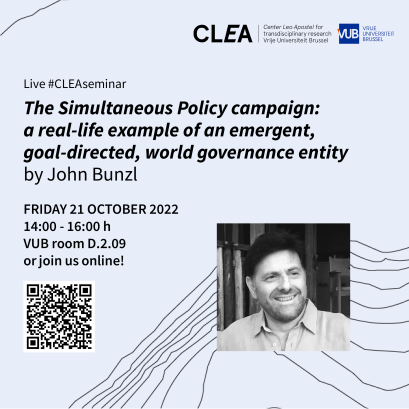 Practical info21/10/2022 - 14:00 - 21/10/2022 - 16:00
Practical info21/10/2022 - 14:00 - 21/10/2022 - 16:00CLEA seminar. The Simultaneous Policy Campaign - by John Bunzl
The Simultaneous Policy campaign (SIMPOL) is a real-life example of a goal-directed entity that has evolved spontaneously from networks of nations and corporations. In this seminar, John Bunzl will explain how SIMPOL is able to drive nations to simultaneously implement solutions to global problems such as climate change.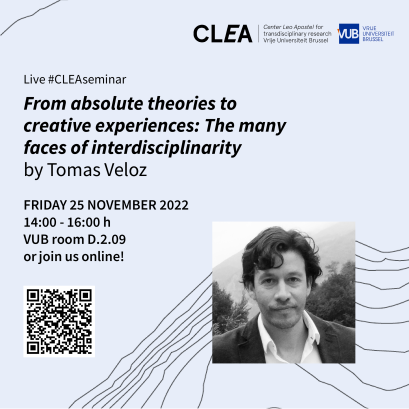 Practical info25/11/2022 - 14:00 - 25/11/2022 - 16:00
Practical info25/11/2022 - 14:00 - 25/11/2022 - 16:00CLEA SEMINAR. From absolute theories to creative experiences: The many faces of interdisciplinarity - by Tomas Veloz
Studies of interdisciplinarity generally distinguish between theory and practice as the two modes of interdisciplinarity. The former wants to find better conceptualizations of problems, the latter focuses on efficient communication and the implementation of solutions. In this talk, Tomas Veloz will take a step back to this traditional view. He proposes that interdisciplinarity is not only a powerful way to solve problems, but also to conceive human life in a more embracing way.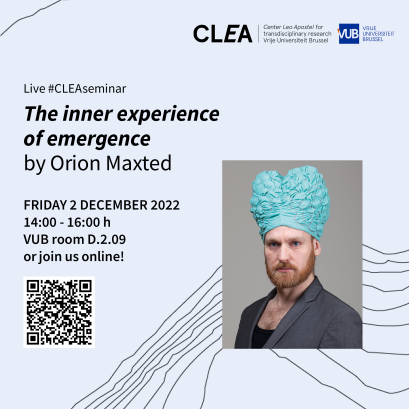 Practical info02/12/2022 - 14:00 - 02/12/2022 - 16:00
Practical info02/12/2022 - 14:00 - 02/12/2022 - 16:00CLEA SEMINAR. The inner experience of emergence - by Orion Maxted
Western traditional theatre and science approach the world in a similar way: they both create ‘models’ of human behaviour, society and the natural world; and both approach the world, and the models they create, with an objective separation, as if looking at something from the ‘outside’. In this seminar, Orion Maxted wants to contrast this objective separation with a kind of play informed by children’s games, cybernetics, and immersive post-dramatic theatre which he proposes as a novel transdisciplinary embodied approach to theatre, science and systemic modelling.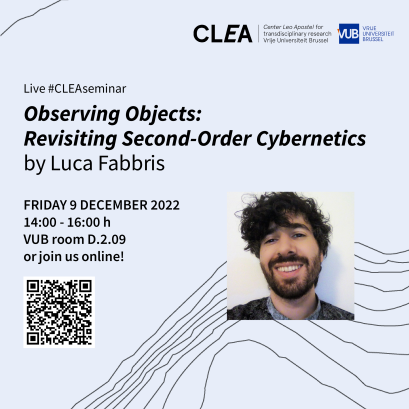 Practical info09/12/2022 - 14:00 - 09/12/2022 - 16:00
Practical info09/12/2022 - 14:00 - 09/12/2022 - 16:00CLEA SEMINAR. Observing Objects: Revisiting Second-Order Cybernetics - by Luca Fabbris
What is an object that an observer can observe and what is an observer that can observe an object? A minor line of thought in second-order cybernetics radically subverts the way in which this question is posed: What is an object that can observe an observer; and what is an observer that an object can observe? This bizarre inversion is rooted in an ontology that takes observation as a primitive concept, and both objects and observers as modes of existence of the observation. In this seminar, Luca Fabbris will focus on the theoretical implications of this line of thought which recognizes the autonomy of objects and offers a theoretical framework that combines both object-oriented and process/action-oriented ontologies.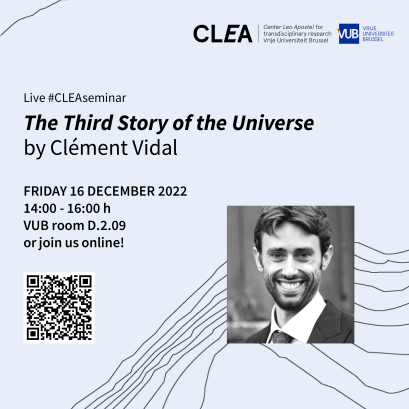 Practical info16/12/2022 - 14:00 - 16/12/2022 - 16:00
Practical info16/12/2022 - 14:00 - 16/12/2022 - 16:00CLEA SEMINAR. The Third Story of the Universe - by Clément Vidal
Where do we come from? Where are we going? What is our role in life? Traditionally, religious worldviews answer such big questions through myths and rituals.
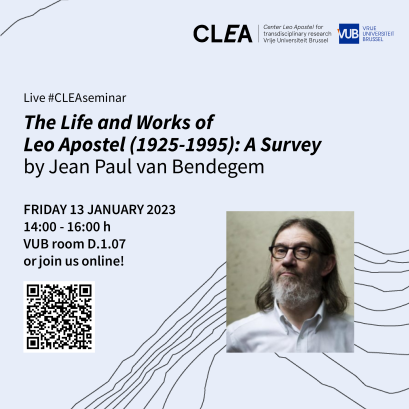 Practical info13/01/2023 - 14:00 - 13/01/2023 - 16:00
Practical info13/01/2023 - 14:00 - 13/01/2023 - 16:00CLEA SEMINAR. The Life and Works of Leo Apostel (1925-1995): A Survey - by Jean Paul van Bendegem
The Center Leo Apostel is named after the Belgian philosopher and logician Leo Apostel, who was a professor at the Vrije Universiteit Brussel and the Ghent University. In this seminar, professor emeritus Jean Paul van Bendegem will give an impression of who Leo Apostel was, both in his life and in his writings, together with some personal recollections. He hopes to show why the research group CLEA is named after him.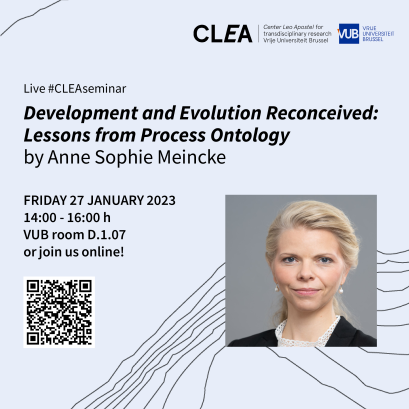 Practical info27/01/2023 - 14:00 - 27/01/2023 - 16:00
Practical info27/01/2023 - 14:00 - 27/01/2023 - 16:00CLEA SEMINAR. Development and Evolution Reconceived: Lessons from Process Ontology - by Anne Sophie Meincke
According to a new movement within the philosophy of biology, living beings shouldn’t be conceived as substances but as processes. This so-called ‘process biology’ draws on process ontology, which is a long but mostly marginalised, philosophical tradition of understanding reality in dynamical terms. In this seminar, Anne Sophie Meincke will show how the right version of process ontology and, hence, of process biology can help improve biological concepts of development and evolution.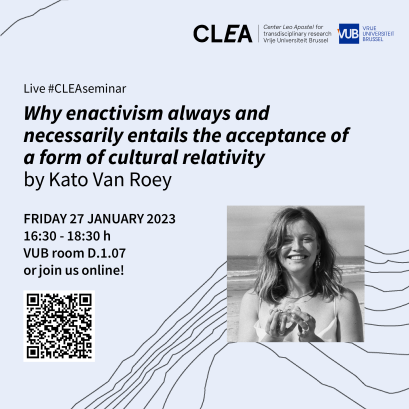 Practical info27/01/2023 - 16:03 - 27/01/2023 - 18:30
Practical info27/01/2023 - 16:03 - 27/01/2023 - 18:30CLEA SEMINAR. Why enactivism always and necessarily entails the acceptance of a form of cultural relativity - by Kato Van Roey
Enactivism is the view that cognition emerges from the interaction between an acting organism and its surroundings. An organism does not passively receive information from its environment, but generates meaning or ‘enacts’ a world through its sensorimotor activity. Enactivists oppose a universalist view on mind and meaning and appeal to context in their attempt to do so, just like cultural relativists do. In this presentation, Kato Van Roey will clarify how enactivism and cultural relativism relate by carefully scrutinizing their similarities and differences. Van Roey proposes that enactivism necessarily entails a form of cultural relativism because of its focus on context, yet one that is rid of uncomfortable consequences.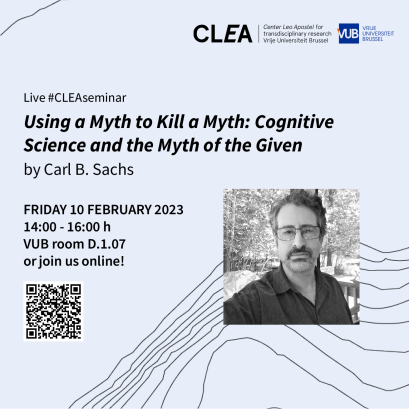 Practical info10/02/2023 - 14:00 - 10/02/2023 - 16:00
Practical info10/02/2023 - 14:00 - 10/02/2023 - 16:00CLEA SEMINAR. Using a Myth to Kill a Myth - by Carl B. Sachs
The American philosopher Wilfrid Sellars has become well-known for his criticism of "the Myth of the Given". But what the Myth is, and how it should be overcome, remain controversial. In this seminar, Carl B. Sachs will argue that overcoming the Myth requires an account of the causal processes that underpin and make possible our scientific achievements.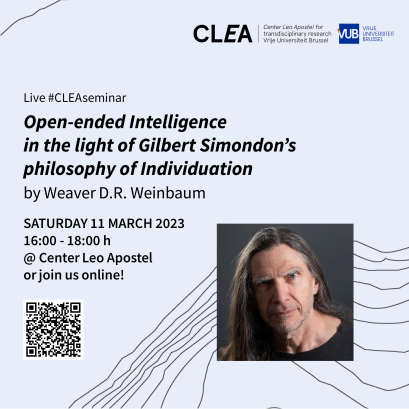 Practical info11/03/2023 - 16:00 - 11/03/2023 - 18:00
Practical info11/03/2023 - 16:00 - 11/03/2023 - 18:00CLEA SEMINAR. Open-ended Intelligence in the light of Gilbert Simondon’s philosophy of Individuation - by Weaver D.R. Weinbaum
Powerful Artificial Intelligence (AI) generative tools such as chatGPT and DALLE-2 are reaching the awareness of the wide public. It is, therefore, high time to deepen our understanding of the generative processes and the philosophical thinking behind them.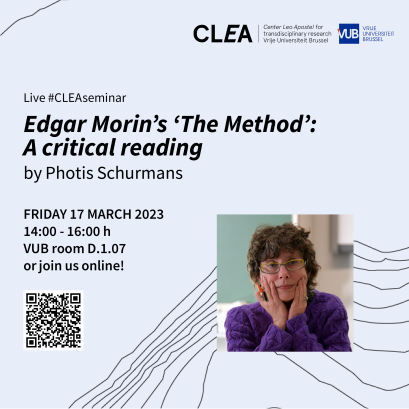 Practical info17/03/2023 - 14:00 - 17/03/2023 - 16:00
Practical info17/03/2023 - 14:00 - 17/03/2023 - 16:00CLEA SEMINAR. Edgar Morin’s ‘The Method’: A critical reading - by Photis Schurmans
The French philosopher and sociologist Edgar Morin worked for almost 30 years on his 2.500-pages masterwork ‘The Method’ (1977-2004). In this seminar, Photis Schurmans will go through the main concepts put forward by Morin to clarify his vision of complex thinking. This lecture intends to be an introduction for those who are not acquainted with Morin’s work.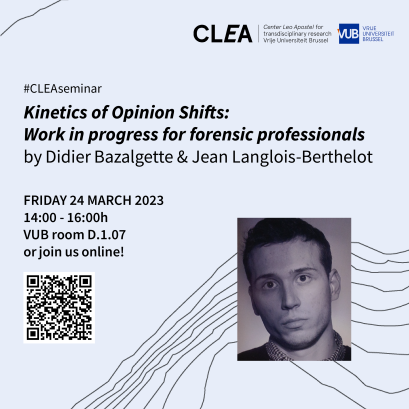 Practical info24/03/2023 - 14:00 - 24/03/2023 - 16:00
Practical info24/03/2023 - 14:00 - 24/03/2023 - 16:00CLEA SEMINAR. Kinetics of Opinion Shifts: Work in progress for forensic professionals - by Didier Bazalgette & Jean Langlois-Berthelot
Decision sciences share common features with physics and biology. The large number of interacting agents renders decision sciences amenable to statistical physics approaches and agent-based models. However, these models generally have low operational applicability. In this seminar, Bazalgette and Langlois-Berthelot will share a work in progress that investigates the "kinetics of opinion shifts" in the context of subversion exposure.
Events 2021/22
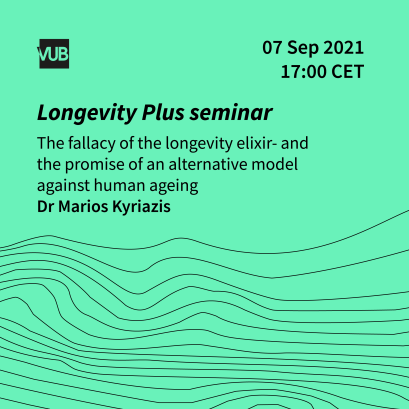 Practical info07/09/2021 - 17:00 - 07/09/2021 - 18:30
Practical info07/09/2021 - 17:00 - 07/09/2021 - 18:30Longevity Plus seminar: The fallacy of the longevity elixir - Dr Marios Kyriazis
We are cordially inviting you to the online seminar The fallacy of the longevity elixir- and the promise of an alternative model against human ageing by Dr Marios Kyriazis. Longevity Plus seminar series are organized by our new CLEA Longevity Plus Research Group: a trans
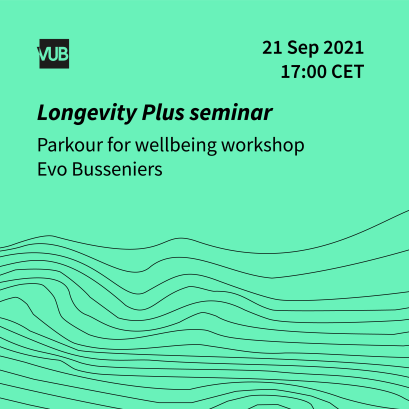 Practical info21/09/2021 - 17:00 - 21/09/2021 - 18:30
Practical info21/09/2021 - 17:00 - 21/09/2021 - 18:30Longevity Plus seminar: Parkour for wellbeing workshop - Evo Busseniers
We are cordially inviting you to the workshop Parkour for wellbeing by Evo Busseniers. Longevity Plus seminar series are organized by the CLEA Longevity Plus Research Group: a transdisciplinary approach to wellbeing.
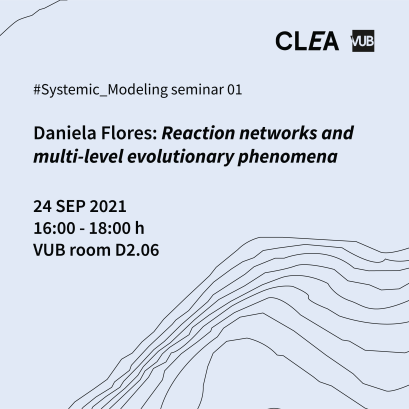 Practical info24/09/2021 - 16:00 - 24/09/2021 - 18:00
Practical info24/09/2021 - 16:00 - 24/09/2021 - 18:00Reaction networks and multi-level evolutionary phenomena - Daniela Flores
Systemic Modeling seminar 01:
Reaction networks and multi-level evolutionary phenomena
Daniela Flores
Friday 24 September 2021
16:00 - 18:00
hroom D 2.06, VUB campus
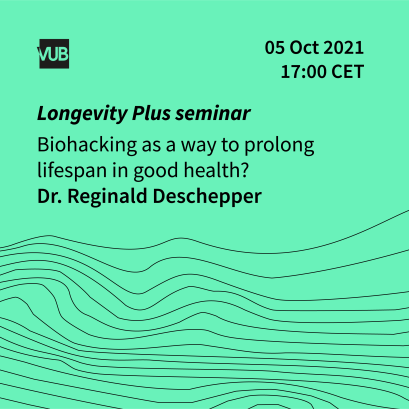 Practical info05/10/2021 - 17:00 - 05/10/2021 - 18:30
Practical info05/10/2021 - 17:00 - 05/10/2021 - 18:30Longevity Plus seminar: Biohacking as a way to prolong lifespan in good health? - Dr. Reginald Deschepper
We are cordially inviting you to the online seminar Biohacking as a way to prolong lifespan in good health? by Dr.
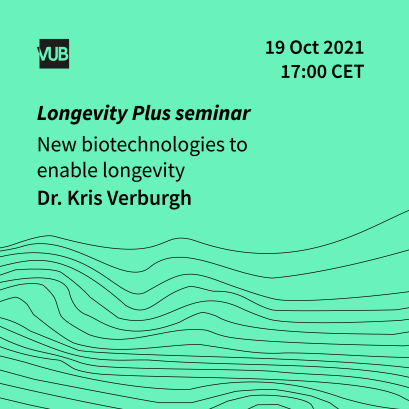 Practical info19/10/2021 - 17:00 - 19/10/2021 - 18:30
Practical info19/10/2021 - 17:00 - 19/10/2021 - 18:30Longevity Plus seminar: New biotechnologies to enable longevity - Dr. Kris Verburgh
Next Longevity Plus seminar organized by the CLEA Longevity Plus Research Group: a transdisciplinary approach to wellbeing. The group aims to integrate and elaborate scientific approaches towards a long and happy life.
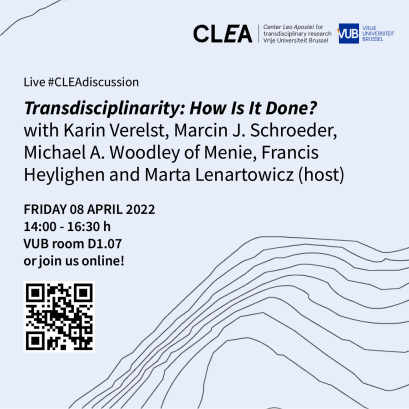 Practical info08/04/2022 - 14:00 - 08/04/2022 - 16:30
Practical info08/04/2022 - 14:00 - 08/04/2022 - 16:30CLEA seminar + live discussion. Transdisciplinarity: How Is It Done?
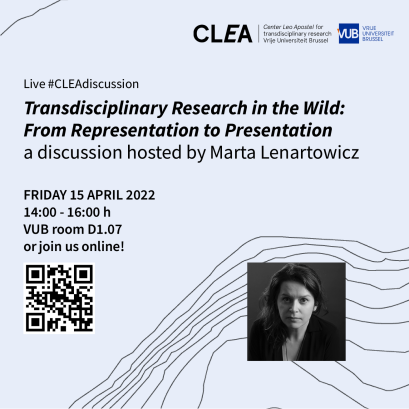 Practical info15/04/2022 - 14:00 - 15/04/2022 - 16:00
Practical info15/04/2022 - 14:00 - 15/04/2022 - 16:00CLEA live discussion. Transdisciplinary Research in the Wild: From Representation to Presentation
The previous CLEA debate, ‘Transdisciplinarity: How is it Done?’, invited the academic community to revisit the practices of transdisciplinary research from a methodological and processual angle.
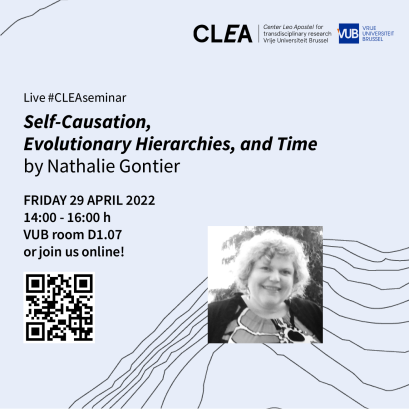 Practical info29/04/2022 - 14:00 - 29/04/2022 - 16:00
Practical info29/04/2022 - 14:00 - 29/04/2022 - 16:00CLEA seminar. Self-Causation, Evolutionary Hierarchies, and Time - by Nathalie Gontier
Evolution doesn’t only occur vertically but also horizontally via a group of mechanisms called 'reticulate evolution’, which makes the 'tree of life’ look more like a 'web of life’. In this talk, Nathalie Gontier will explain how she uses this theoretical causation framework to understand teleonomy as a problem of ‘self-causation’.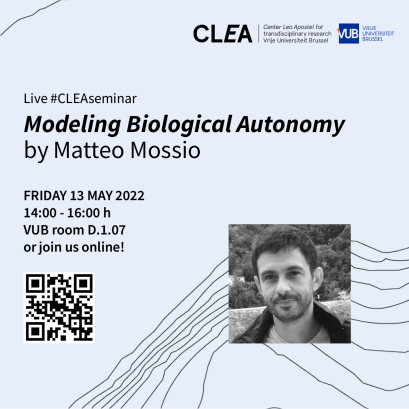 Practical info13/05/2022 - 14:00 - 13/05/2022 - 16:00
Practical info13/05/2022 - 14:00 - 13/05/2022 - 16:00CLEA seminar. Modeling Biological Autonomy - by Matteo Mossio
In this CLEA seminar, philosopher Matteo Mossio will discuss how the theory of autonomy, which is a model for self-organization, can open up new perspectives for understanding biological phenomena. In particular, he will discuss how the theory of autonomy can shape modeling strategies of biological phenomena by relying on the concept of ‘constraints closure’, which is a set of processes that form a closed loop. He will also discuss the challenges that the theory of autonomy has to take up in relation to modeling strategies.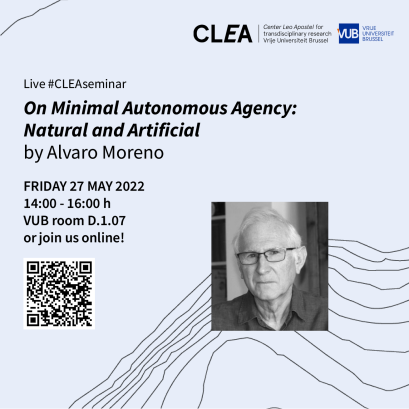 Practical info27/05/2022 - 14:00 - 27/05/2022 - 16:00
Practical info27/05/2022 - 14:00 - 27/05/2022 - 16:00CLEA seminar. On Minimal Autonomous Agency: Natural and Artificial - by Alvaro Moreno
In this talk, philosopher Alvaro Moreno will explore autonomous agency, how to artificially generate minimal forms of agency and what we can learn from biology about the minimal material conditions required to generate agential capacities.
Seminars 2020/21
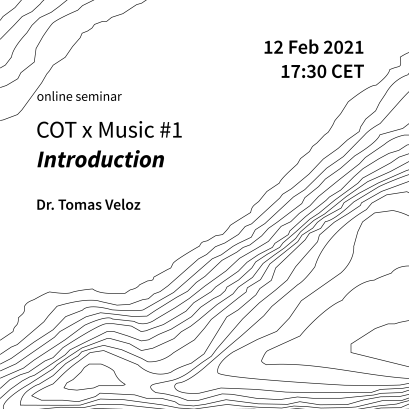 Practical info12/02/2021 - 17:30 - 12/02/2021 - 19:30
Practical info12/02/2021 - 17:30 - 12/02/2021 - 19:30COT x Music #1: Introduction - Dr. Tomas Veloz
Introduction to the basics of COT by Dr. Tomas Veloz
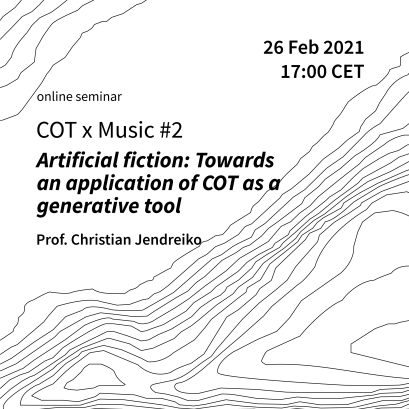 Practical info26/02/2021 - 17:00 - 26/02/2021 - 19:00
Practical info26/02/2021 - 17:00 - 26/02/2021 - 19:00COT x Music #2: Generative tool - Prof. Christian Jendreiko
Artificial Fiction: Towards an application of COT as a generative tool
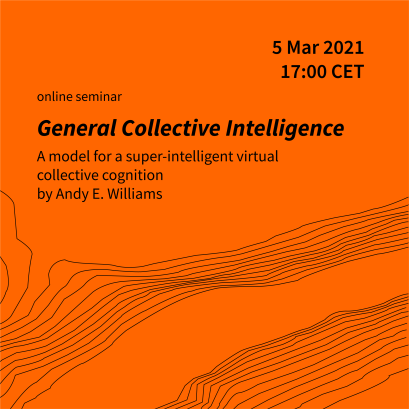 Practical info05/03/2021 - 17:00 - 05/03/2021 - 19:00
Practical info05/03/2021 - 17:00 - 05/03/2021 - 19:00CLEA seminar: General Collective Intelligence by Andy E. Williams
Andy E.
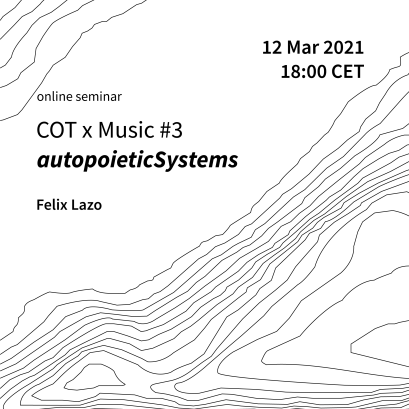 Practical info12/03/2021 - 18:00 - 12/03/2021 - 20:00
Practical info12/03/2021 - 18:00 - 12/03/2021 - 20:00COT x Music #3: Autopoietic systems - Felix Lazo
From performance to interactive installations
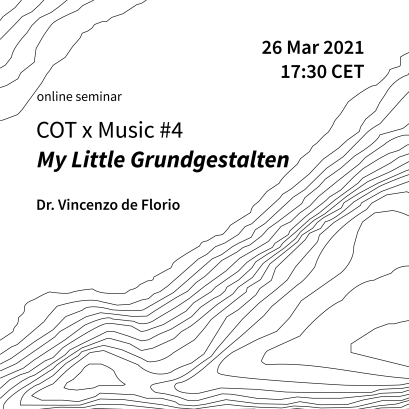 Practical info26/03/2021 - 17:30 - 26/03/2021 - 19:30
Practical info26/03/2021 - 17:30 - 26/03/2021 - 19:30COT x Music #4: My Little Grundgestalten - Dr. Vincenzo de Florio
Events - Archive
NEWS
 Practical info18/09/2024 - 14:00 - 18/09/2024 - 16:00
Practical info18/09/2024 - 14:00 - 18/09/2024 - 16:00CLEA - CLPS SEMINAR. Mathematics and Epistemic Trespassing - by Andrew Aberdein
“Epistemic trespassing” is a recently proposed term to describe experts who make pronouncements outside their domain of expertise. Such trespassing can be productive, but caution is required. How does epistemic trespassing apply to mathematics? In this seminar, professor Andrew Aberdein will distinguish three cases of trespassing and identify both benign and malign examples, which will help clarify some features of epistemic trespassing in general. FOR MORE INFO, PLEASE CLICK TITLE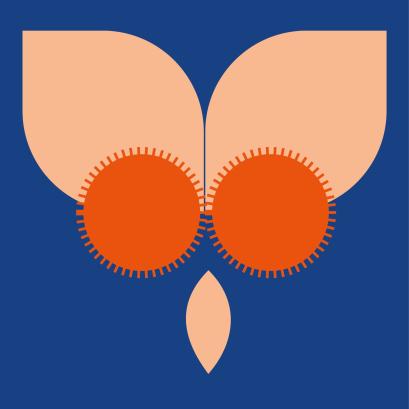
School of Thinking: Open-door session, Monday 8 September, 2025
Final weeks! As the 2025–2026 academic year approaches, we would like to put the School of Thinking Edition Tau back on your summer radar.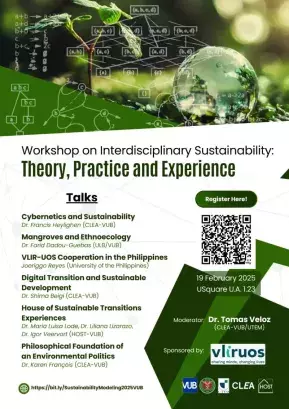
Workshop on Interdisciplinary Sustainability: Theory, Practice and Experience
The workshop explores sustainability, environmental science, and international cooperation by blending theoretical perspectives—from cybernetics to philosophy—with practical applications in conservation and development.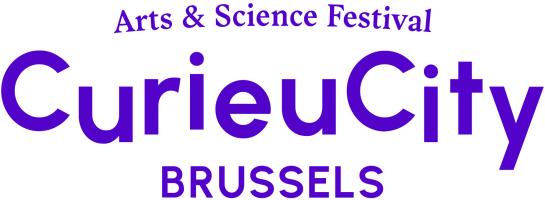
CLEA ArtScience at CurieuCity, Brussels, Nov 29 - Dec 1
Come and join CLEA at the CurieuCity Arts and Science festival in Brussels running the entire upcoming weekend from Friday 29 Nov to Sunday 1 December.
N2 2024 conference: The Noosphere & the Global South
After the successful N 2 conference at UC Berkeley on ‘ The Noosphere: the future of human collective consciousness ’ in 2023, CLEA is now co-organizing a follow-up N 2 conference ‘ The Noosphere & the Global South ’.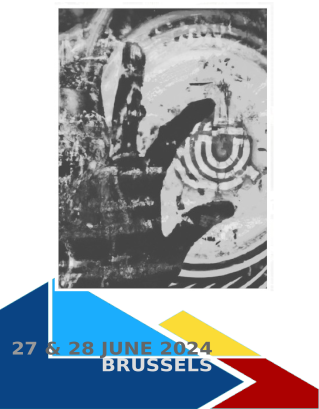
Maths and Society Seminar: Changing the Models? Brussels, June 2024
On June 27 and 28, the conference "Maths and Society" in Brussels will explore questions and perspectives on the use of mathematics and data science in social intervention and sustainable development.
February 2026
| Mo | Tu | We | Th | Fr | Sa | Su |
|---|---|---|---|---|---|---|
|
26
|
27
|
28
|
29
|
30
|
31
|
1
|
|
|
|
|
|
|
|
|
|
2
|
3
|
4
|
5
|
6
|
7
|
8
|
|
|
|
|
|
|
|
|
|
9
|
13
|
14
|
15
|
|||
|
|
|
|
|
|||
|
|
|
|
||||
|
16
|
17
|
18
|
19
|
20
|
21
|
22
|
|
|
|
|
|
|
|
|
|
23
|
24
|
25
|
27
|
28
|
1
|
|
|
|
|
|
|
|
|
|
